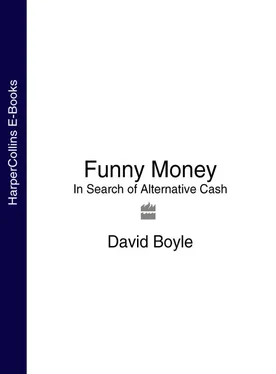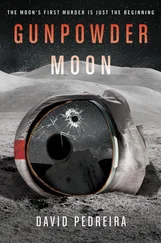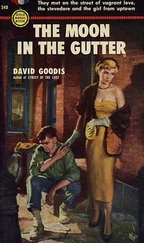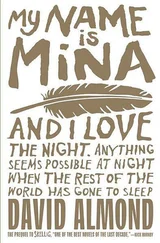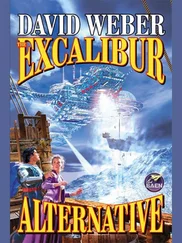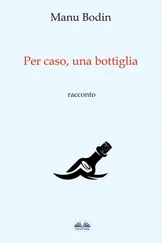FUNNY MONEY
In Search of Alternative Cash
David Boyle

For my parents
Cover
Title Page FUNNY MONEY In Search of Alternative Cash David Boyle
Dedication For my parents
Introduction: In search of the new alchemists
Chapter 1: Washington: money as time
Chapter 2: Still Washington: money as moral energy
Chapter 3: Philadelphia: money as burden
Chapter 4: New York: money as religion
Chapter 5: Ithaca: money as lifeblood
Chapter 6: Minneapolis: money as information
Chapter 7: Berkshires: money as vegetables
Chapter 8: How to be richer
Epilogue: A funny money world
Index
Acknowledgements
Keep Reading
About the Author
Find out more
Copyright
About the Publisher
Introduction In search of the new alchemists Contents Cover Title Page FUNNY MONEY In Search of Alternative Cash David Boyle Dedication For my parents Introduction: In search of the new alchemists Chapter 1: Washington: money as time Chapter 2: Still Washington: money as moral energy Chapter 3: Philadelphia: money as burden Chapter 4: New York: money as religion Chapter 5: Ithaca: money as lifeblood Chapter 6: Minneapolis: money as information Chapter 7: Berkshires: money as vegetables Chapter 8: How to be richer Epilogue: A funny money world Index Acknowledgements Keep Reading About the Author Find out more Copyright About the Publisher
‘Like a lot of mothers, Zabau Shepard has some charge cards, but she can’t use them. It’s not that her credit has gone to the dogs; it’s that she is a dog.’ The Daily Progress, Charlottesville, Virginia, 1990, quoted in James Grant’s Money of the Mind.
Picture the scene. Millions of people gathered on a rocky island off the northern coast of Europe, and getting hungrier. They only have two fivers and a couple of crumpled dollars between them .
‘What do we do?’ Gordon Brown asks Kenneth Clarke .
‘Make them sit down,’ he says. Then he converts the money into small change and, when he has given thanks, begins to distribute it among the crowd. And by the end the whole crowd was satisfied and there was enough left over to fill twelve large unit trusts .
The cabinet, commentators and economists, needless to say, were astonished. After all, it was quite a different method of creating money from the usual one, which involves taxing the small amount at 25 per cent, carefully allocating the proceeds, together with some words of wisdom about working harder, and carrying on doing so until it all runs out .
Money just isn’t like that, is it. The one thing we learn about money is that it isn’t infinite, and it certainly doesn’t behave like the Feeding of the Five Thousand. Short of winning the Lottery, we are dependent on eking out our small incomes to fit our expanding bills.
But something peculiar is happening to money. There was a time when we knew where we were with it: good solid coins which burned a hole in the pocket just by jiggling up and down, notes which said the Chief Cashier promised ‘to pay the bearer on demand’. You’d earn it, put it in the bank, count it, spend it, then it was gone, and you’d have to earn some more. It was simple and straightforward.
The Prime Minister Sir Alec Douglas-Home was even said to balance the budget using matchsticks. It was an endearing picture of a more innocent age: you could imagine Britain’s First Lord of the Treasury wrapping hot towels round his head and putting off the dire moment when he would have to sit down and work it all out, complaining that he hadn’t been any good at sums at Eton.
Nowadays things seem very different. The number of professionals involved in different aspects of looking after money, the futures dealers, the traders and arbitragers, reads almost like a cast list from The Canterbury Tales , with all its priests, pardoners and summoners. Finance has become a strange complicated global system fuelled by inter-linked computers and burgeoning information. A large institution like Citibank collects all the money in all its branches around the world electronically overnight and invests it until the morning. Tiny slivers of percentages of transactions are bundled together in deals to pay the traders. Nothing is wasted in the financial markets.
It is a peculiar shadowy world, where rumour and mood can shift billions of pounds in a few minutes. And where Chancellor Norman Lamont, looking at the fragments of his European exchange-rate policy after Black Wednesday, could describe himself as being ‘overwhelmed by a whirlwind’. This view was echoed by former Citibank chairman John Reed, who famously described the financial markets as ‘a little like the physicist who created the bomb’.
‘We see about 400 billion dollars every day of foreign exchange transactions going through the system,’ he said, and that was a good decade ago. By the end of the 1980s, $800 billion a day in electronic payments were going from bank to bank through the Clearinghouse Interbank Payments System in the USA, known as CHIPS – in Britain, we have a similar overheating system called CHAPS – and that figure rises every year. The daily flows in the currency exchanges are now running at an estimated $1,300 billion, and the World Bank reckons that 95 per cent of them are speculative, which means that only 5 per cent is actually related to the real trade which keeps our economies moving along. The rest is froth, but froth with terrifying power over ordinary lives.
If you knock politely at your bank manager’s office door and ask actually to see your money, it’s not going to be there. It will appear on your bank statements, of course, with bizarre fractions charged in interest and service. But you know it will probably be off travelling the globe, investing in massive dam projects, or dabbling in the Tokyo Futures Markets while you’re asleep.
Actually, your money doesn’t exist at all. Money is now blips on computer screens; its value can disappear overnight, it pops up unexpectedly in the form of credit or pseudo-money like air miles or supermarket loyalty cards. Its total demise is widely reported. ‘Cash is dirty, cash is heavy, cash is quaint, cash is expensive, cash is dying,’ said the New York Times magazine recently on its front cover, hailing the advent of sophisticated computer debit cards.
While some people seem to be able to surf this new world of money easily, others don’t. When he fell off his yacht into the Atlantic, Robert Maxwell owed twice as much as Zimbabwe. The rest of us are stuck with the old idea. We believe there is a finite amount of money, which comes to us from employers and occasionally from the government, and we spend it just a little faster than we should. Why aren’t our coins and notes as flexible as they are for what Tom Wolfe called the ‘Masters of the Universe’ in the City of London or Wall Street?
For most of us, money stays irritatingly concrete. It runs out, and we all feel increasingly fearful about it. In the world of glass towers, on the other hand, it is much more flexible: if you don’t have it, you borrow it, discount it, arbitrage it, trade it, ride the market with it, knowing that money increasingly gets its changing value from the psychology of the international market: our hopes, fears, weather patterns, mood swings all effect the value of their money.
Читать дальше
